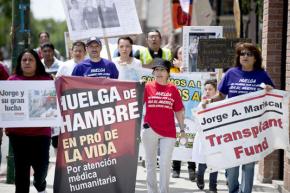Hunger strike for health care
reports on a hunger strike in Chicago's Little Village neighborhood that won treatment for an undocumented immigrant in need of a liver transplant.
A HUNGER strike in Chicago's Little Village neighborhood has won potential medical treatment for one undocumented immigrant, and possibly others--and challenged the brutality of the for-profit health care system that leaves millions to fend for themselves.
The hunger strike began on June 3, when Sonia Lopez, Hilda Burgos, Lorenzo Arroyo, Catalina Arroyo and Father Jose Landaverde, a local Anglican priest, stopped eating solid food as a protest in support of Lorenzo, his brother Elfego Arroyo and Jorge Marsical--who all face discrimination based on their immigration status at two local hospitals.
Both Lorenzo and Elfego suffer from amyloidosis--which can only be cured by a liver transplant. Mariscal is in need of a kidney transplant.
Despite their life-threatening illnesses, the three were initially excluded from national organ transplant waiting lists in part because of their lack of health insurance and their immigration status. Undocumented immigrants are 7 million of the 46.3 million uninsured Americans. They are also excluded from national programs like Medicaid or Medicare.

Hilda Burgos, one of the hunger strikers, stated, "The saddest part is that our undocumented communities are asked to donate blood and organs. However, we cannot receive transplants."
The strike continued for more than two weeks, with Lorenzo Arroyo having to resume eating due to the threat of serious health consequences.
But on June 18, a meeting between the hunger strikers and Joe Garcia, vice president of Health Affairs at the University of Illinois, offered hope to the desperate protesters. "We came into an agreement that University of Illinois Medical Center will offer the treatment needed to Lorenzo Arroyo," said Landaverde. "They also agree to continue the dialogue with us and with Rush Medical Center to address the issues of urgent medical care for those who can't access medical care due to their immigration status."
After the meeting, the University of Illinois Hospital said it had agreed to begin the evaluation process for a transplant for Lorenzo.
IN DECEMBER, Father Landaverde had met with Rush officials, the hospital where Elfego Arroyo receives treatment. After that meeting, Elfego was placed on a wait list for a liver transplant at Rush. But UICMC, where Lorenzo Arroyo receives treatment, would not initially agree to place him on a transplant list.
Hunger strikers were asking Loyola University Medical Center (LUMC) and the University of Illinois Chicago Medical Center (UICMC) to waive or greatly lower the costs of transplants with live donors. LUMC, a Catholic institution, prides itself as an institution that "also treats the human spirit." The slogan of UICMC is "Changing medicine, for good."
Both institutions are regarded as top hospitals. The hunger strikers, however, have seen the true face of health care in America--encountering firsthand the hypocrisy of a system that is willing to let people die because of lack of funds, insurance or immigration documentation.
Sonia Lopez, the mother of Jorge Mariscal, a young man in need of a kidney transplant, stated, "Jorge has spent seven years in dialysis...at [LUMC]. Beyond that, the hospital does not want to do more. They don't even let us meet with the doctors, or give us a budget of what it is needed. They tell us that they wont do it because we don't have the means to pay it."
Lorenzo Arroyo's personal tragedy is an example of the cost of being a poor immigrant in America. A former meatpacking worker, Lorenzo spoke about his brother's condition, saying Elfego "is very weak right now. He can't stand up with out collapsing, his pressure is very low. He urgently needs a transplant. My brother Francisco is a legal resident and was able to be in the national list for liver transplants. He already received a transplant nine months ago."
Catalina Arroyo, one of the hunger strikers and an aunt of the Arroyo brothers, explained why they decided to take such desperate action. "I'm on hunger strike because I don't want my nephew to die of his illness as his mom did, [and] his father," she said. "So in their parents' name, I took up the challenge of going on hunger strike to seek compassion from the hospitals."
The hunger strikers gained local media attention, as well as support from the activist community in Chicago. Father Landaverde's church, Our Lady of Guadalupe Anglican Mission, has been a center of refuge for the battered immigrant community of Chicago for nearly a decade.
The National Network of Pastors, Chicago Community and Workers Rights, the Immigrant Youth Justice League, as well as local health care workers and occupiers all lent support to the hunger strikers.
On June 13, a march of nearly 100 people gathered at UICMC to denounce the system that creates these horror stories. "We hold the UIC and Loyola hospitals responsible for any physical damage occurred to the hunger strikers" said Landaverde, even as the strike was taking a tremendous physical toll on the crusaders.
After the June 18 meeting at UICMC, there are plans to continue the public pressure on the Loyola University Medical Center. The stories of the hunger strikers are not exceptional--but the product of a broken society that creates misery suffering for the vast majority.


